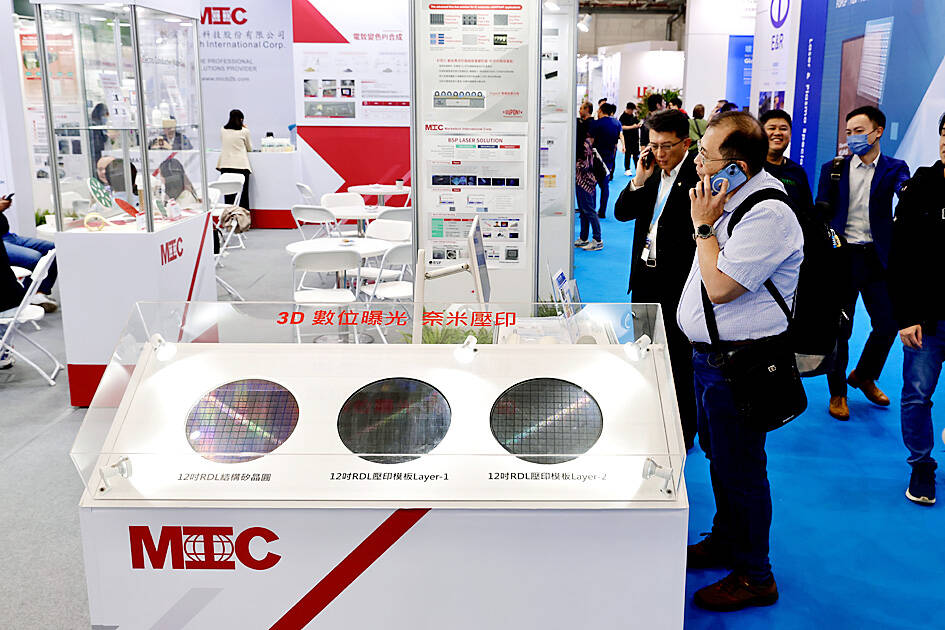Taiwan’s manufacturing output in the first quarter rose 10.72 percent year-on-year to NT$4.898 trillion (US$162.16 billion), the fifth consecutive quarter of annual growth, the Ministry of Economic Affairs said yesterday.
Three of the six major industries in the manufacturing sector posted output growth during the January-to-March quarter, with the computer and optical products industry reporting the largest increase of 32.99 percent, followed by the electronic components industry with a 23.77 percent rise, the ministry said in a report.
The other three industries posted output decreases, with the vehicle industry leading with a decline of 10.3 percent, followed by a 10.65 percent fall in the base metals industry and a 1.25 percent drop in the chemical materials and fertilizers industry, the report said.

Photo: EPA-EFE
“Continued demand for artificial intelligence [AI], high-performance computing [HPC] and cloud data services boosted the production momentum of the information technology and electronics industries in the first quarter. However, traditional industries saw reduced production due to market competition and conservative demand, offsetting some of the growth in the overall output,” the ministry said.
The production value of the electronic components industry — the manufacturing sector’s most important segment — reached NT$1.74 trillion, the highest first-quarter figure, thanks to a 29.65 percent rise in semiconductor output and a 6.1 percent growth in the production of flat panels and related components, the report said.
The production value of computer and optical product suppliers soared to NT$447.7 billion, also a record high for the same quarter, due to solid demand for AI applications and cloud data services, it said.
Producers of machinery equipment last quarter posted an output increase of 10.32 percent year-on-year to NT$222.5 billion, as the semiconductor industry’s active expansion of advanced process production drove demand for semiconductor equipment and machinery components, the report said.
For this quarter, the development of AI and HPC technologies, and strong demand for advanced semiconductor chips and high-end servers are expected to continue to support the steady growth of the manufacturing sector, the ministry said.
However, negative factors such as international trade measures and geopolitical conflicts are expected to disrupt the pace of global economic growth and pose uncertainties for Taiwan’s export-reliant manufacturing sector, it said.

Real estate agent and property developer JSL Construction & Development Co (愛山林) led the average compensation rankings among companies listed on the Taiwan Stock Exchange (TWSE) last year, while contract chipmaker Taiwan Semiconductor Manufacturing Co (TSMC, 台積電) finished 14th. JSL Construction paid its employees total average compensation of NT$4.78 million (US$159,701), down 13.5 percent from a year earlier, but still ahead of the most profitable listed tech giants, including TSMC, TWSE data showed. Last year, the average compensation (which includes salary, overtime, bonuses and allowances) paid by TSMC rose 21.6 percent to reach about NT$3.33 million, lifting its ranking by 10 notches

SEASONAL WEAKNESS: The combined revenue of the top 10 foundries fell 5.4%, but rush orders and China’s subsidies partially offset slowing demand Taiwan Semiconductor Manufacturing Co (TSMC, 台積電) further solidified its dominance in the global wafer foundry business in the first quarter of this year, remaining far ahead of its closest rival, Samsung Electronics Co, TrendForce Corp (集邦科技) said yesterday. TSMC posted US$25.52 billion in sales in the January-to-March period, down 5 percent from the previous quarter, but its market share rose from 67.1 percent the previous quarter to 67.6 percent, TrendForce said in a report. While smartphone-related wafer shipments declined in the first quarter due to seasonal factors, solid demand for artificial intelligence (AI) and high-performance computing (HPC) devices and urgent TV-related orders

Prices of gasoline and diesel products at domestic fuel stations are this week to rise NT$0.2 and NT$0.3 per liter respectively, after international crude oil prices increased last week, CPC Corp, Taiwan (台灣中油) and Formosa Petrochemical Corp (台塑石化) said yesterday. International crude oil prices last week snapped a two-week losing streak as the geopolitical situation between Russia and Ukraine turned increasingly tense, CPC said in a statement. News that some oil production facilities in Alberta, Canada, were shut down due to wildfires and that US-Iran nuclear talks made no progress also helped push oil prices to a significant weekly gain, Formosa said

MINERAL DIPLOMACY: The Chinese commerce ministry said it approved applications for the export of rare earths in a move that could help ease US-China trade tensions Chinese Vice Premier He Lifeng (何立峰) is today to meet a US delegation for talks in the UK, Beijing announced on Saturday amid a fragile truce in the trade dispute between the two powers. He is to visit the UK from yesterday to Friday at the invitation of the British government, the Chinese Ministry of Foreign Affairs said in a statement. He and US representatives are to cochair the first meeting of the US-China economic and trade consultation mechanism, it said. US President Donald Trump on Friday announced that a new round of trade talks with China would start in London beginning today,